The 2nd National Congress of Small-Scale Artisanal Fishers and Mollusk Gatherers of Costa Rica was held on November 8, 9 and 10, 2021
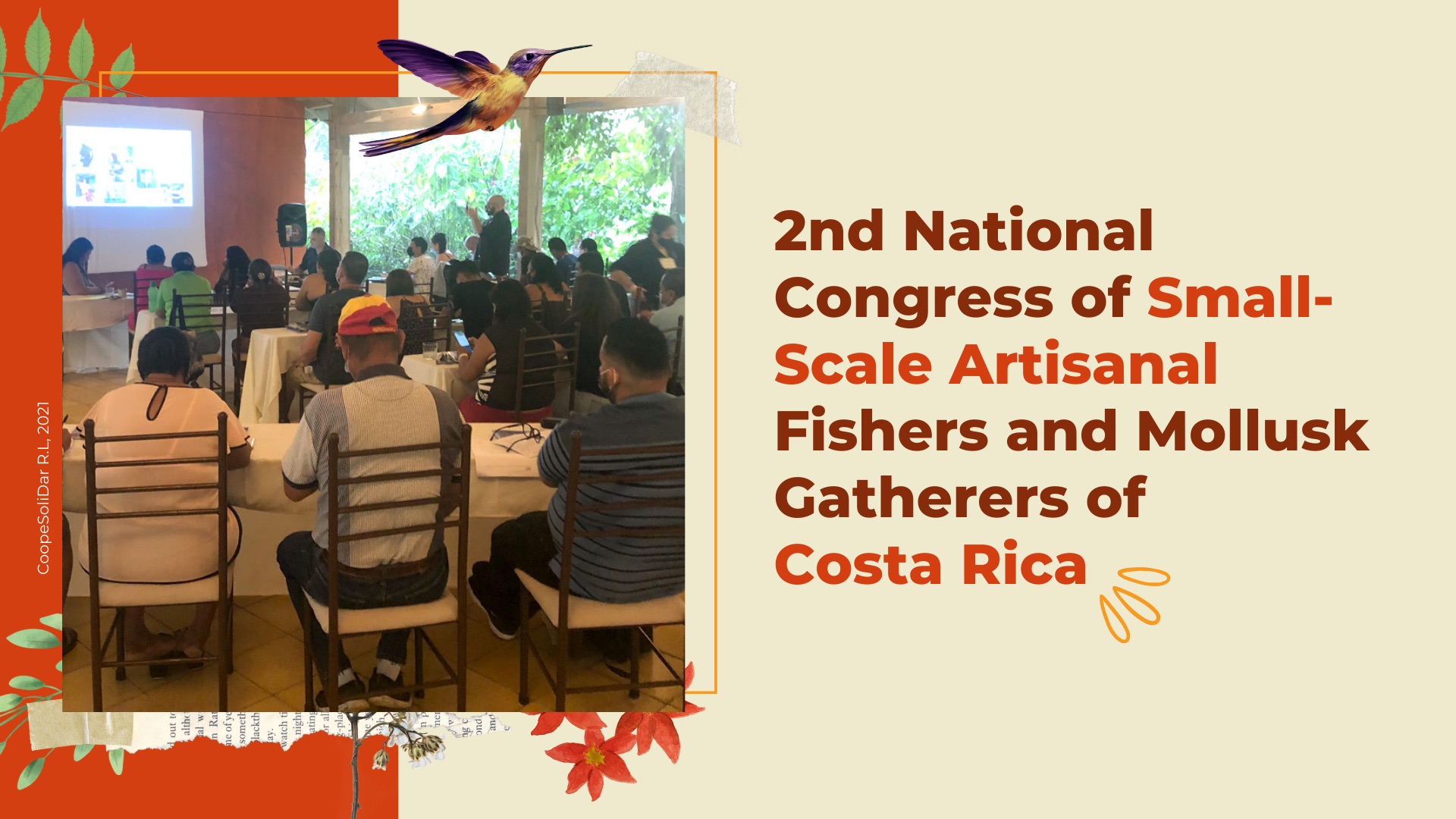
The 2nd National Congress of Small-Scale Artisanal Fishers and Mollusk Gatherers of Costa Rica was held on November 8, 9 and 10, 2021
By Vivienne Solís Rivera
CoopeSoliDar R.L. (ICCA Consortium Member)
During the pandemic in Costa Rica, as in all parts of the world, virtuality has undermined the abilities of local coastal communities and the small-scale artisanal fishing and mollusk gathering sectors in general to raise their voices and call attention to the situations that their communities and territories face, due to an ocean-based “blue economy” that sidelines them, threatens the fundamental vitality of their territories, and interferes with their deep commitment to marine conservation and sustainable use.
The first National Congress of Small-Scale Artisanal Fishers and Mollusk Gatherers in Costa Rica was held in 2018. It provided an opportunity for members of the sector to agree on a common struggle, garner wider recognition of the sector’s contributions, and present the Congress Manifesto to the country’s authorities.
Continuing its work during the two years of pandemic in Costa Rica, the Network of Marine Areas of Responsible Fishing and Marine Territories of Life and CoopeSoliDar R.L. (Member, ICCA Consortium) decided to hold this second national meeting. We were overjoyed to have over 60 fishers and mollusk gatherers, all members of communities from both coasts, some independent and others belonging to the Network of Responsible Marine Areas and Marine Territories of Life, which today represents more than 22 small-scale artisanal fishing communities.
OPENING
ARACELLY JIMÉNEZ, PRESIDENT OF COOPEMOLUSCHOMES R.L.
This 2nd Congress was facilitated by Aracelly Jiménez who introduced herself to her colleagues and energetically took on the leadership role.
“I am the president of CoopeMolusChomes R.L., a cooperative of mollusk gatherers in the marine-coastal territory of life of Chomes. We are a Territory of Life because my great-grandparents and grandparents lived there, my parents live there, and I have lived there since I was born. A mollusk gatherer has a very interesting and productive life. We have a life linked to the resources of the coast and the sea, we are people with special knowledge, and we are a happy and social people; that is why we have been able to overcome all the challenges we face, in a place far from the capital and unknown to many. We have overcome the moments when the sea gets sick (red tides), natural events such as floods that kill the pianguas (a type of mollusk) and conchas (shellfish), and the abandonment by institutions that fail to assume their responsibilities beyond political periods or the interests of the moment.
We are here together today to promote the Network of Marine Areas of Responsible Fishing and Marine Life Territories, along with organizations such as CoopeSoliDar R.L., which have managed, despite many difficulties and obstacles, to be here with good energy and a great deal of love for our work as artisanal and mollusk gatherers – to think about the future and to tell, in proactive ways, our fellow Mesoamericans that we are going forward with humane, sustainable, fair and equitable fishing.”
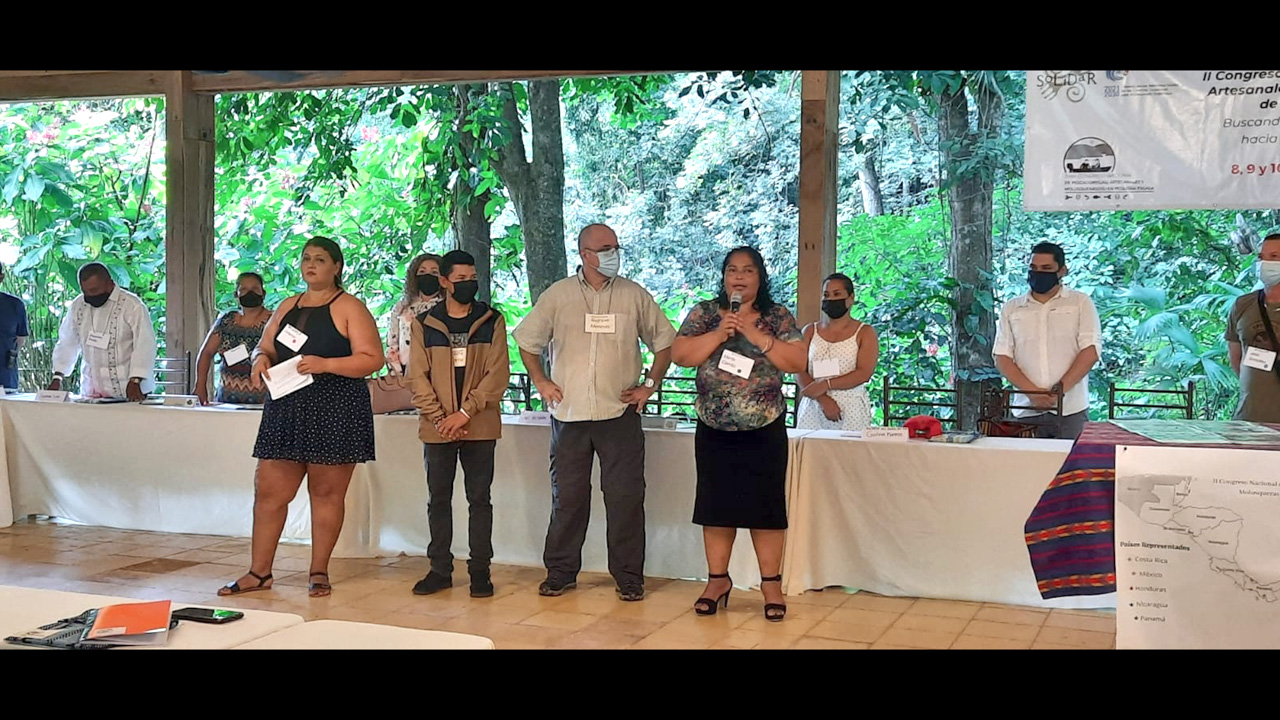
CoopeSoliDar R.L., 2021. Aracelly Jiménez, Lázaro Mecha, Father Gustavo Meneses and María Carrillo gave the welcoming remarks.
OBJECTIVES
THIS 2nd CONGRESS PROPOSED FOUR VERY IMPORTANT OBJECTIVES
1. Strengthen the capacities and skills of artisanal fishers and mollusk gatherers to gain recognition of their rights.
2. Share lessons learned about the 12 Oars Model as an instrument to further the formalization of artisanal fishers and mollusk gatherers in Costa Rica.
3. Contribute to the recognition of artisanal fishing, from a rights-based approach,* within the framework of the International Year of Artisanal Fisheries.
4. Expand the vision of sustainable management of the sea by learning from experiences in marine territories of life of other Indigenous Peoples in Central America.
PRIORITY MOMENTS
TO ACHIEVE THE OBJECTIVES, THE EVENT HAS TWO KEYY MOMENTS:
An Institutional Forum, where public, private, and entities engaged in a critical and proactive dialogue to identify the needs of the sector. Participants included INCOPESCA (National Institute of Fisheries and Aquaculture), INAMU (National Institute for Women), INDER (Rural Development Institute), IMAS (Mixed Institute for Social Assistance), COMEX (Ministry of Foreign Trade), SENASA (National Service for Animal Security) SINAC-MINAE (National System of Protected Areas, Ministry of the Environment), Ombudsman, CANEPP (National Chamber of Exports of Fishery Products), and the Office of the ILO (International Labor Organization).
REFLECTIONS
THE FISHERMEN AND FISHERWOMEN REFLECTED ON THEIR SITUATION AND SHARED THEIR THOUGHTS:
- Sometimes the government imposes the laws on us instead of asking what we need. We need policies that are built from the bottom up, not from the top down.
- Each community and each region must be seen as connected to the fishing village(s). We need to coordinate more within the territories.
- The institutions must see the needs of each family, to consider who is who on an individual level. At present, the government is only focusing on their own institutions, and they do not see the needs of the people who live there.
- There should be a plan for families. Conservation is very nice, but we must be part of it in order to use the resources of the sea in a sustainable way.
- As for representation, there should be more support for the Caribbean sector. Most of the institutions that support our fishing communities are in the Caribbean sector. For the next meeting, we hope to see at least two institutions that have worked in the Caribbean with us. We need to see more people representing us in the Caribbean – we hope the next Congress will be held there.

CoopeSoliDar R.L, 2021. Institutional Forum with the participation of INCOPESCA, INAMU, INDER, IMAS, COMEX, SENASA, CANEP, ILO, and SINAC.
ANALYSIS AND RECOGNITION
Secondly at this meeting, we developed a plan for the analysis and recognition of organizations in marine-coastal territories, covering four critical issues: (1) land tenure; (2) access rights to the sea; (3) dignified and decent work; (4) fair and equitable economy. These topics began with the introductory talk “Advances in public policy for small-scale artisanal fishing”, which guided the discussion.
Each of the critical issues became a conversation in which we discussed the concepts and implications of each topic. The topic was introduced, along with general guidelines, then opened to contributions and specific examples from the territories present.
DISCUSSION 1. LAND TENURE
DISCUSSION 1. LAND TENURE
What do we understand by land tenure?
Land tenure is linked to food security. It is the right of those of us who live on the coast to have a safe place. It is the sense of ownership and entitlement. It is intrinsic and ancestral; it is the right to develop our coastal communities with integrity. We cannot go ahead with [the current] fishing and agriculture initiatives; we need development. We do not have access to loans, to credit for development.
Elements contributed from CoopeSoliDar R.L.
Land ownership in Costa Rica is very diverse. It includes registered properties, concessions, occupants with use permits, and illegal squatters. Costa Rica presents anomalous and anarchic situations regarding land ownership. We do not own the right to our lands even though we have lived there for time immemorial. As a result of the weak application of the current legislation and the poor management of various municipalities, the occupation of the maritime-terrestrial zone (MTZ) by outside groups has gone unchallenged.
Today this situation in the Indigenous territories is far from resolved, and the ZMT has not been recognized as part of the territories of the people who have lived there for generations. We have a national law that does not apply to Indigenous territories, and that compromises the rights to land and to Indigenous territories.
Positive Examples
The Kekoldi Indigenous Territory is in recovery process. The Collection Center for the Association of Women Shrimp Peelers and Processors of the Marine Area of Responsible Fishing of Barra del Colorado is now in operation. The SSF Guidelines mention that States should adopt appropriate measures to identify, register and respect tenure rights and their legitimate holders. They should recognize and protect resources that are publicly owned, and used and managed collectively. Bill 20750 has been proposed, check articles 19, 20 and 21.
Cases for reflection:
The Marine Area of Responsible Fishing of Barra del Colorado: tenure, gasoline, and collection center
Led by Lilia Briones and María Carrillo
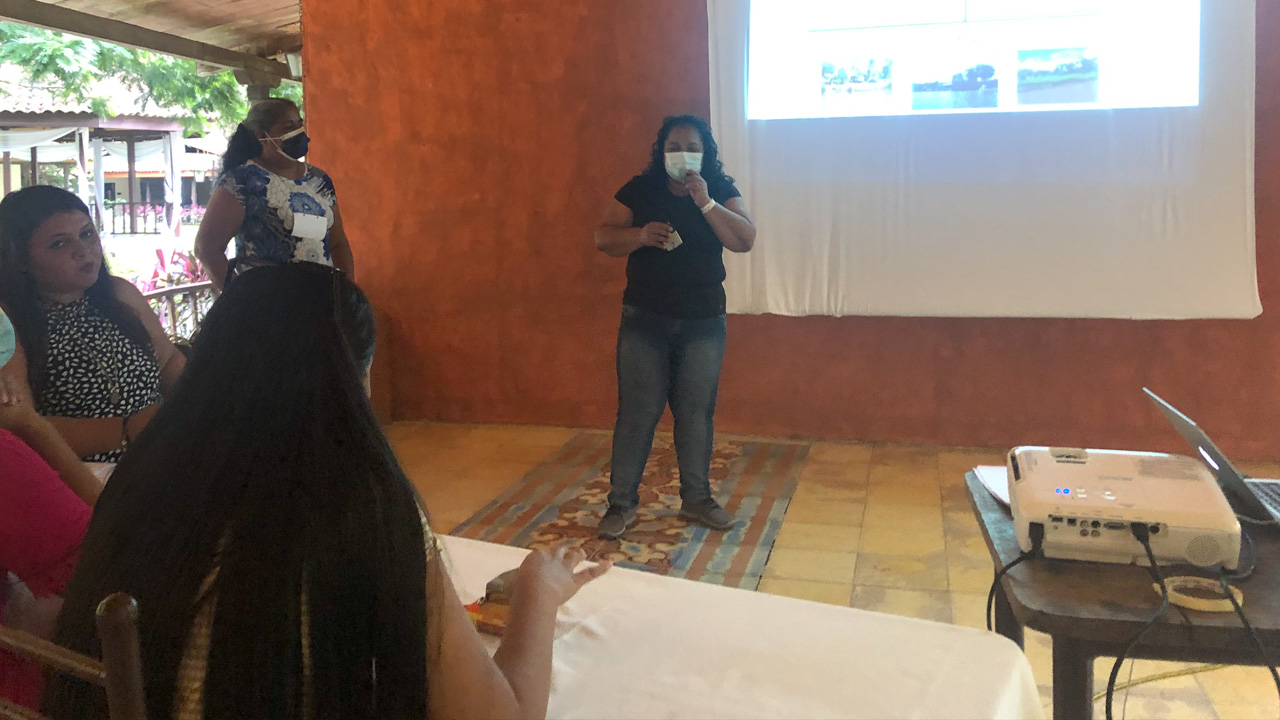
CoopeSoliDar R.L., 2021. María Carrillo and Lilia Briones presenting the Marine Area of Responsible Fishing of Barra del Colorado
Dominicalito Marine Area of Responsible Fishing
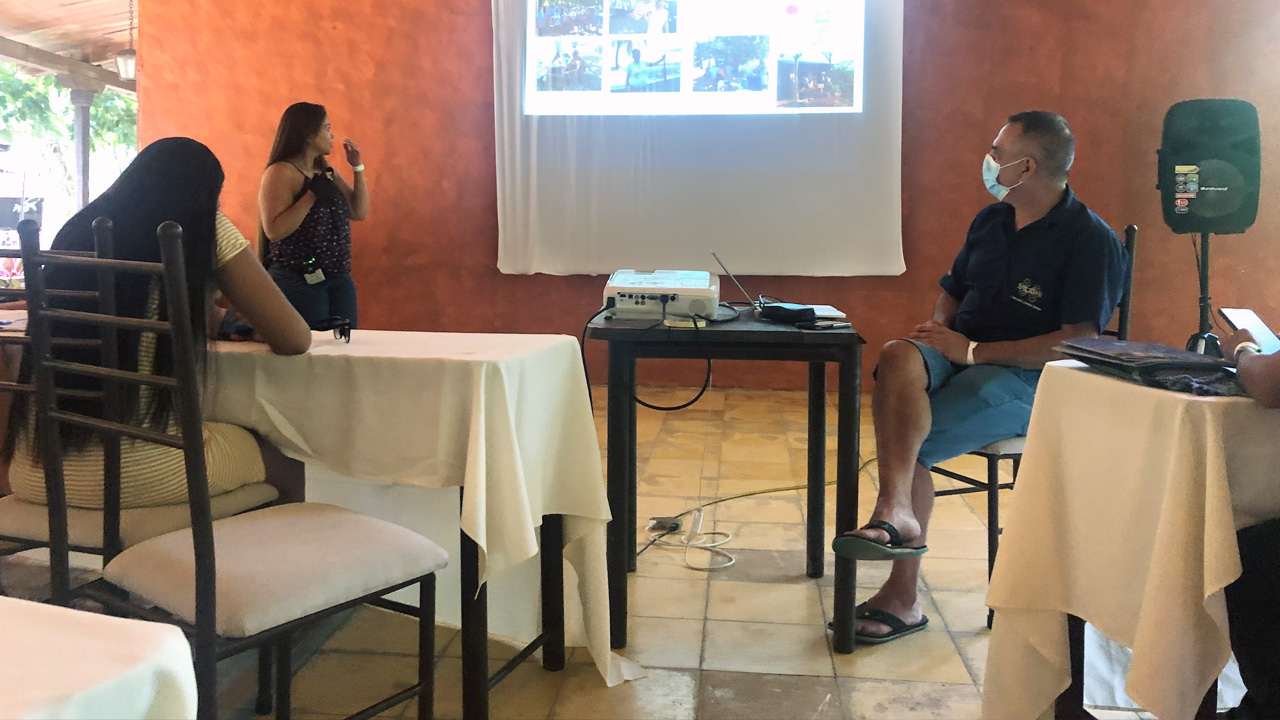
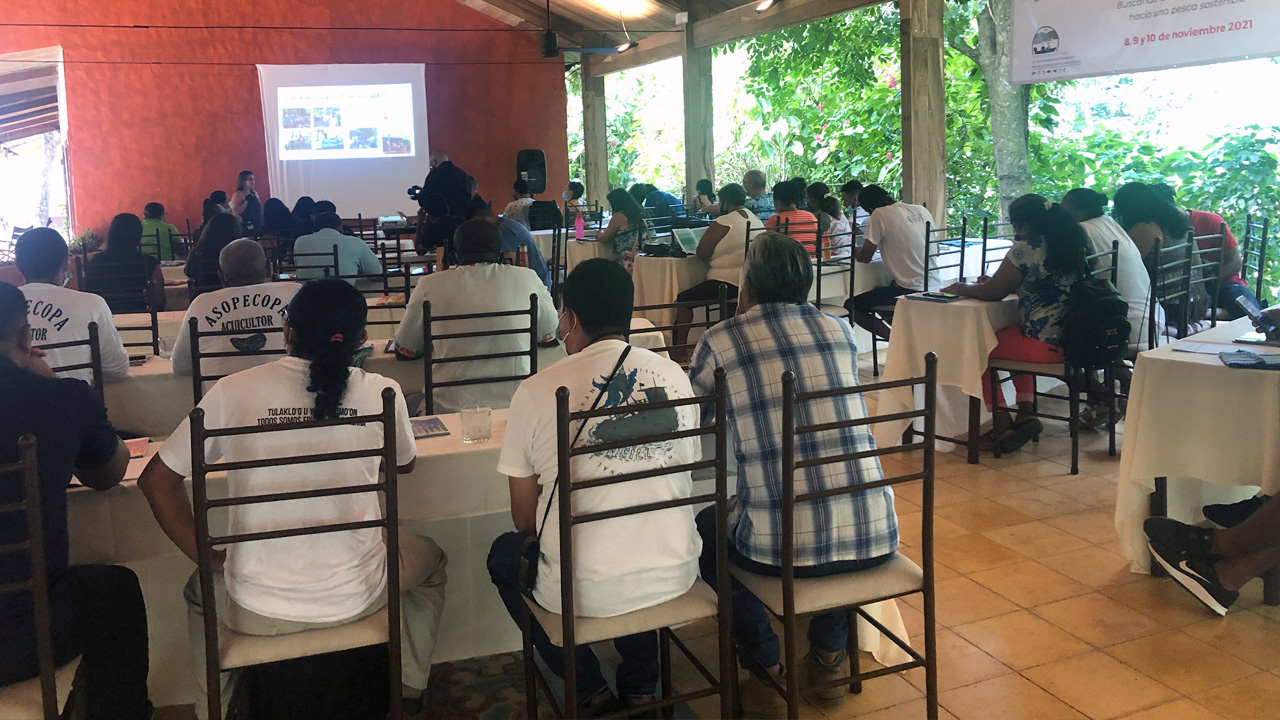
CoopeSoliDar R.L., 2021. Pamela Méndez presenting the Marine Area of Responsible Fishing of Dominicalito
DISCUSSION 2. RIGHTS OF ACCESS TO FISHING
DISCUSSION 2. RIGHTS OF ACCESS TO FISHING
What do we mean by rights of access to fishing?
These rights include the access to formal licenses, but also the right to resources. A thorough study of legislation and regulations should be carried out regarding these rights. Two different permissions for Captaincy of Ports need to be harmonized. MOPT allows for three miles, whereas INCOPESCA gives permission for 5 or 6 miles. It’s not just the licenses, but the possibility of sustainably exploiting fishing resources.
Contributions by CoopeSoliDar R.L.
Real estate development, tourism, the construction of marinas, and marine conservation, all exclude communities from the access they have traditionally had to marine-coastal resources, calling into question their access to natural resources, their food security, their livelihoods, their culture, and the natural resources upon which their development is based.
Small-scale artisanal fishing is not recognized as a productive activity. The consolidation of a form of community governance materialized after discussing the different existing types of property and possible scenarios of marine governance.
By a vote of the Comptroller in 2009, INCOPESCA does not grant more fishing licenses without technical and scientific studies. Today we have the hope of the implementation of the Executive Decree.
Positive examples
Marine Areas of Responsible Fishing are models of shared governance. They are also spaces for participatory decision-making, the creation and construction of knowledge, and the transformation and resolution of conflicts.
From the SSF Guidelines: States should determine the rights of use and tenure of resources, taking into account social, economic and environmental objectives. If 8 out of 10 fishers are working informally, then the government is only considering very few out of the total number. The Network has suggested the Proposal of the 12 Oars and the Proposal of Law 20750, especially looking at Art. 23, 24, and 25, which do not at present solve the issues.
Cases for reflection
TÁRCOLES AND CABUYA FISHING RIGHTS
By Jeannette Naranjo and Sara García
Tárcoles Marine Area of Responsible Fishing
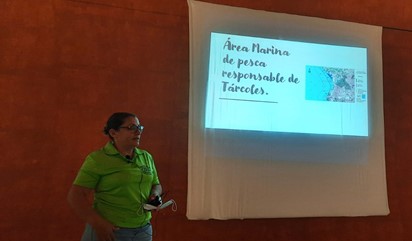
CoopeSoliDar R.L., 2021. Jeannette Naranjo presenting the Tárcoles Marine Area of Responsible Fishing.
Cabuya Marine Territory of Life in the Cabo Blanco Marine Management Area

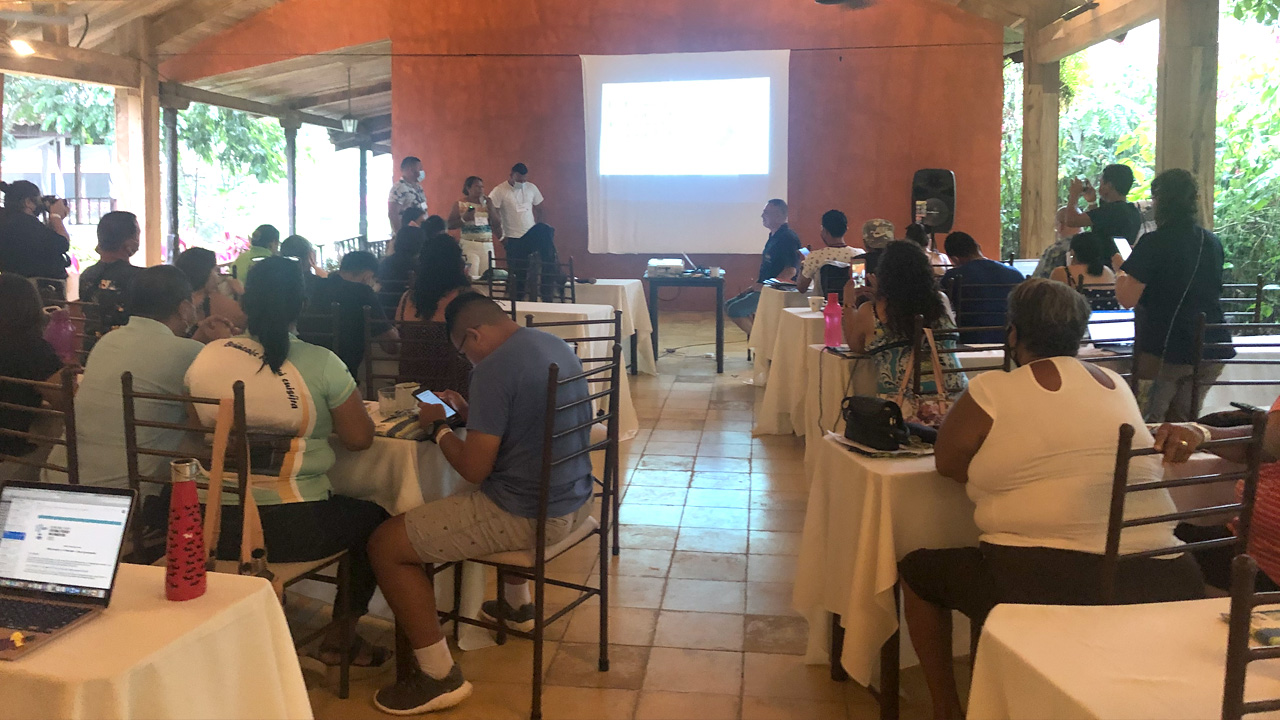
CoopeSoliDar R.L., 2021. Sara García, Joshua Valverde, and Jafet Valverde presenting the Cabo Blanco Marine Management Area.
DISCUSSION 3. THE RIGHT TO DIGNIFIED AND DECENT WORK
DISCUSSION 3. THE RIGHT TO DIGNIFIED AND DECENT WORK
What do we understand by dignified and decent work?
“We all deserve decent work. I am an adult, and I cannot find a job. There are times when you can enter the sea and other times not. Sometimes you must wait for the sea to go down. I go down the river in my little boat and there I get something to eat” (Clara Díaz, CoopeBonifacio).
Fishing in the rivers is a dignified activity that we must recognize. Fishing is not an easy job. Decent work is a human right. The sector faces informal arrangements, poverty, and vulnerability in Costa Rica. All this affects access to social security, credits, subsidies, training services, as well as involvement in collective actions. The small-scale artisanal sector is being divided. The fisherwomen find it even more difficult. We have the right to social security and a fair pension.”
Contributions by CoopeSoliDar R.L.
When work is not deemed worthy, many critical problems arise. If there is no work, there is no dignity. This government’s treatment of the artisanal fishing sector needs to change so that there is decent work on the coasts. At the end of the day, we all have the right to dignified and decent work. Positive examples need to be recognized.
There are precedents in the country, such as the case of women domestic workers, who have been given special consideration. In the case of CoopeTárcoles R.L., there is a differentiated set of rules. The other example is the Work Protocol during the COVID-19 pandemic, of the Association of Women Shrimp Peelers and Processors of Barra del Colorado.
It is the responsibility of the State to promote social security protection for workers in small-scale fisheries, as well as to promote decent work for all in fishing.
Positive examples
Study on women fishers and work in value chains (ILO, INAMU, CoopeSoliDar R.L.), Bill 20750, Social Development and Decent Employment, with four articles on the subject (42, 43, 44, and 45)
CASE OF COOPEMOLUSCHOMES R.L.
By Aracelly Jiménez, president
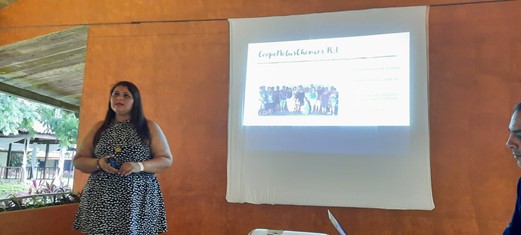
CoopeSoliDar R.L., 2021. Aracelly Jiménez presenting the CoopeMolusChomes Case.
DISCUSSION 4. IMPORTANCE OF A FAIR AND EQUITABLE ECONOMY IN THE VALUE CHAINS OF ARTISANAL FISHING
DISCUSSION 4. IMPORTANCE OF A FAIR AND EQUITABLE ECONOMY IN THE VALUE CHAINS OF ARTISANAL FISHING
What do we understand by fair and equitable economy in artisanal fishing value chains?
This means adding value to products obtained from the sea, including filleting, that is, that the true value of products from small-scale artisanal fishing be recognized. The fair economy is one in which our own products are marketed, and we can give more work to others.
Selling directly in the markets: when it comes to selling, many things are required of us, but there are no barriers for other imported sea products; we ate tilapia for lunch at this hotel, which means the hotel did not consider the fish from Tárcoles, the small-scale community just in front of us.
Contributions by CoopeSoliDar R.L.
Artisanal fishing is one of the first economic activities known worldwide, and the nutrition of a country may depend on this activity. An economic vision of small-scale fishing without the social, economic, and cultural aspects does not respond to the needs of fishing communities.
Positive examples
Model 12 Oars; Executive Decree 42955 MAG supporting the Guidelines. Project 20,750 eliminated art. 36, 37, 38, 39, 40, as well as 2l 51, which is the labeling of responsible fishing products. However, the guidelines for small-scale recreational fishing have not been established. Those in the tourist fleet are being offered licenses that benefit them, without considering the effects on small-scale artisanal fishers.
Marine Area of Responsible Fishing of San Juanillo
By Manuel Rolando Solorzano
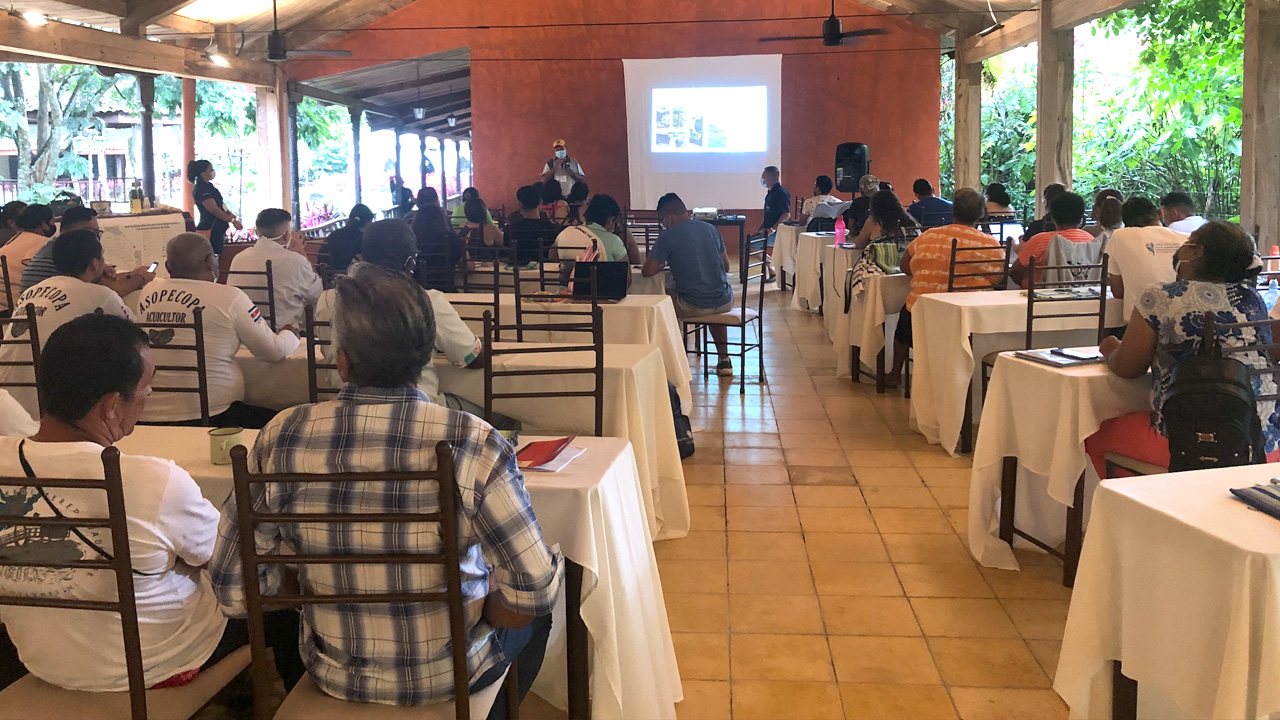
CoopeSoliDar R.L., 2021. Rolando Manuel presenting the Marine Area of Responsible Fishing of San Juanillo
Venado Island Marine Area of Responsible Fishing – Gulf of Nicoya: aquaculture initiatives
By Sonia Medina
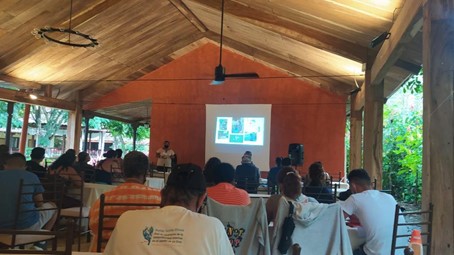
CoopeSoliDar R.L., 2021. Sonia Medina presenting the Venado Island Marine Area of Responsible Fishing – Gulf of Nicoya
Impact of the Mercado del Mar [Sea Market] on the women’s groups of Chomes, La Islita, Golfo Dulce, and Tárcoles
By CoopeSoliDar R.L.
The congress was a place to share the innovative ideas of small-scale artisanal fisheries with the young fisherwomen and men present.
Prior to the Congress, young people from the Network communities were invited to share solutions and ideas of their own, in a contest that invited them to reflect on:
1. A solution that could be applied in any of the phases of small-scale mollusk gathering and harvesting.
2. A solution that could contribute to the responsible use of marine resources.
3. A solution that could contribute to strengthening the lifestyle, identity, and culture of the people of the sea.
The first prize in the men’s category went to two young men, Jafet Valverde and Joshua Valverde, from the Cabuya community, for their innovative proposal about the proper use of a “green stick” for small-scale artisanal fishing. They were chosen by the evaluation committee because their proposal responded perfectly to the three selection criteria included in the conditions. It also showed a sense of innovation, an important objective of the contest.
The first prize in the women’s category was awarded to Dayrin Gómez from the community of Chomes, for her innovative proposal for a “rake” that could be used for greater ease in the extraction of mollusks. Her idea was also chosen based on the three selection criteria, and because of its originality.
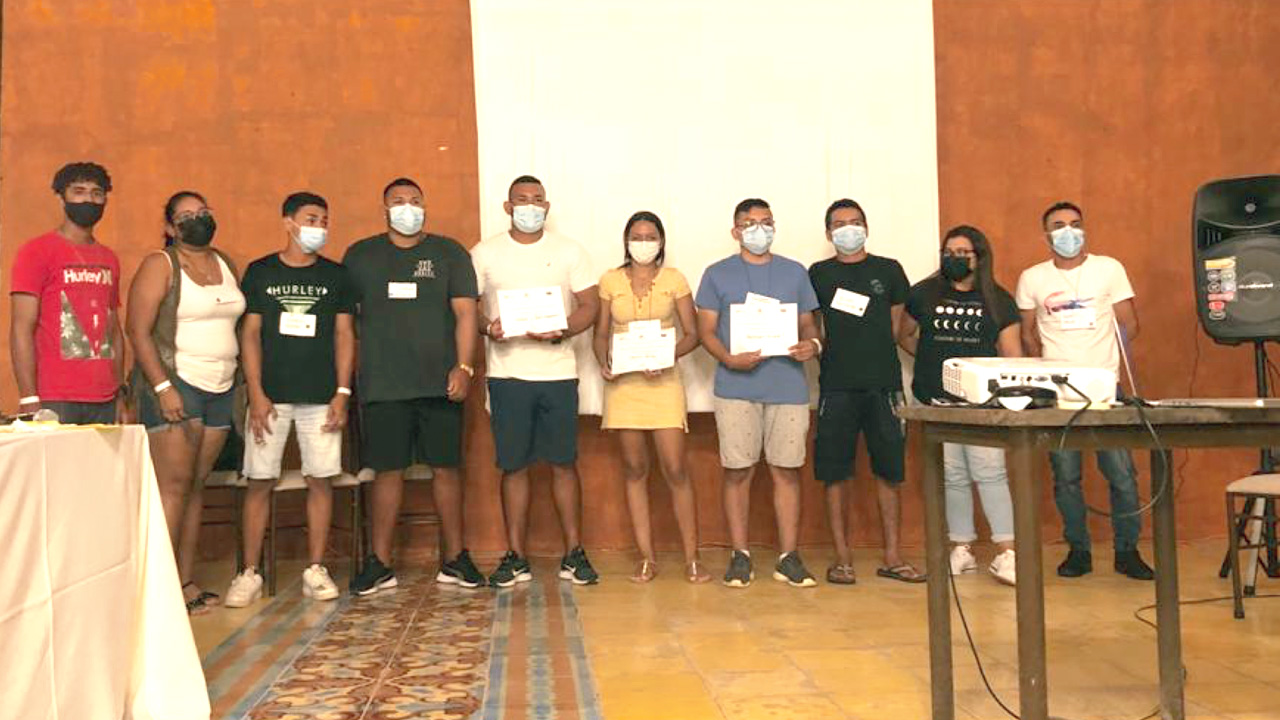

CoopeSoliDar R.L., 2021 Youth Contest, all the participants and the young winners.
Based on the ideas and discussions of the participants in the Congress, a first draft of Positioning was written and discussed, improved, and finally approved in subgroups. It is expected to guide the defense of the rights of fishing communities until the 3rd National Congress planned for next year in the Costa Rican Caribbean as part of the International Year of Small-Scale Artisanal Fisheries.
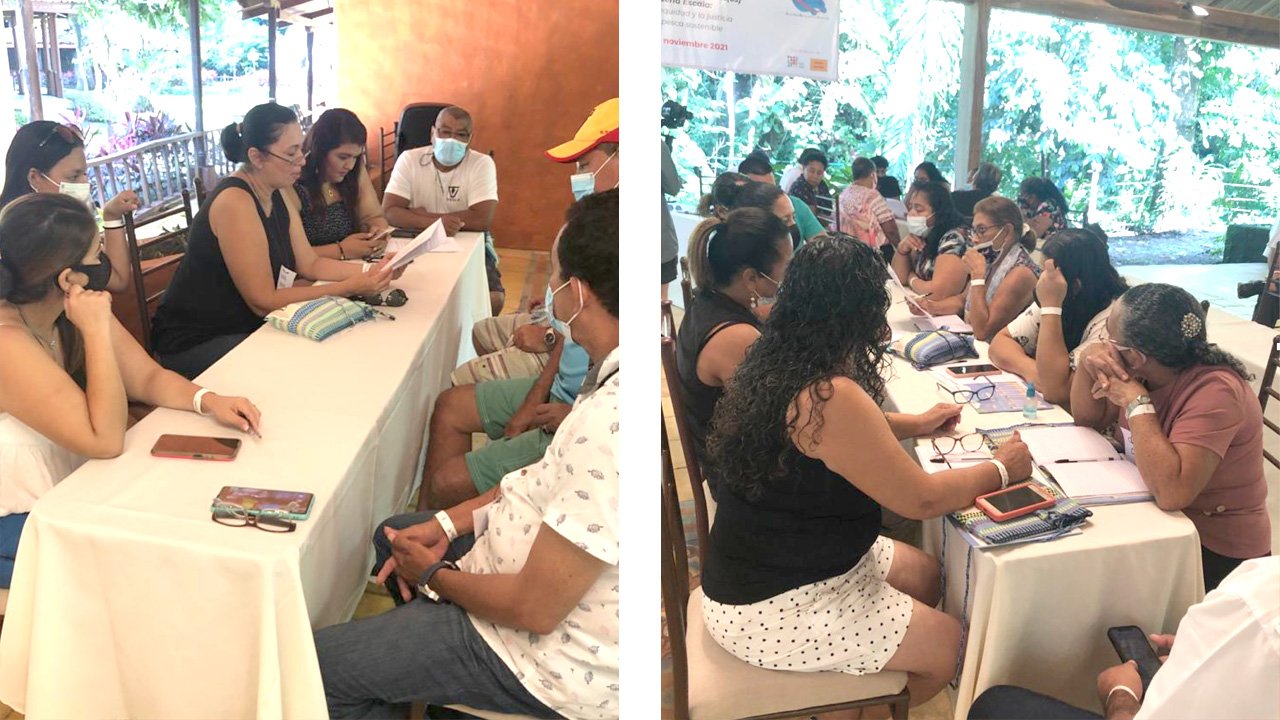
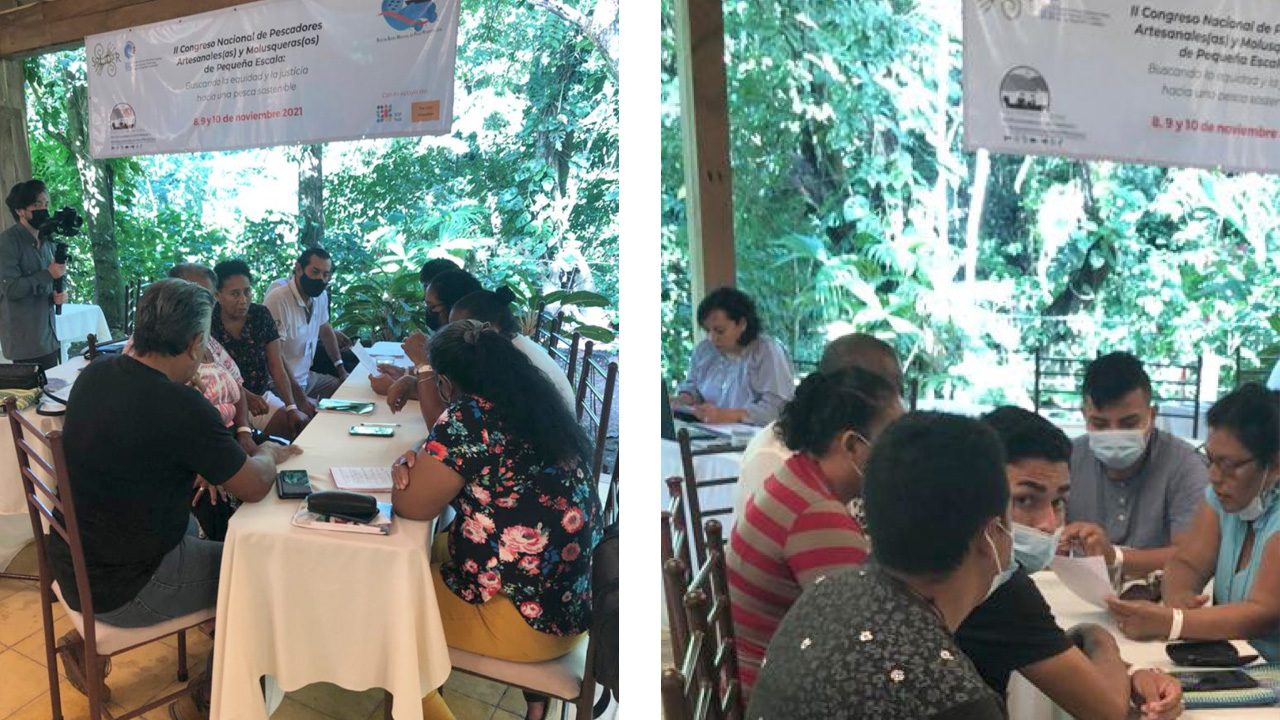
CoopeSoliDar R.L., 2021 Working groups for comments on the manifesto.
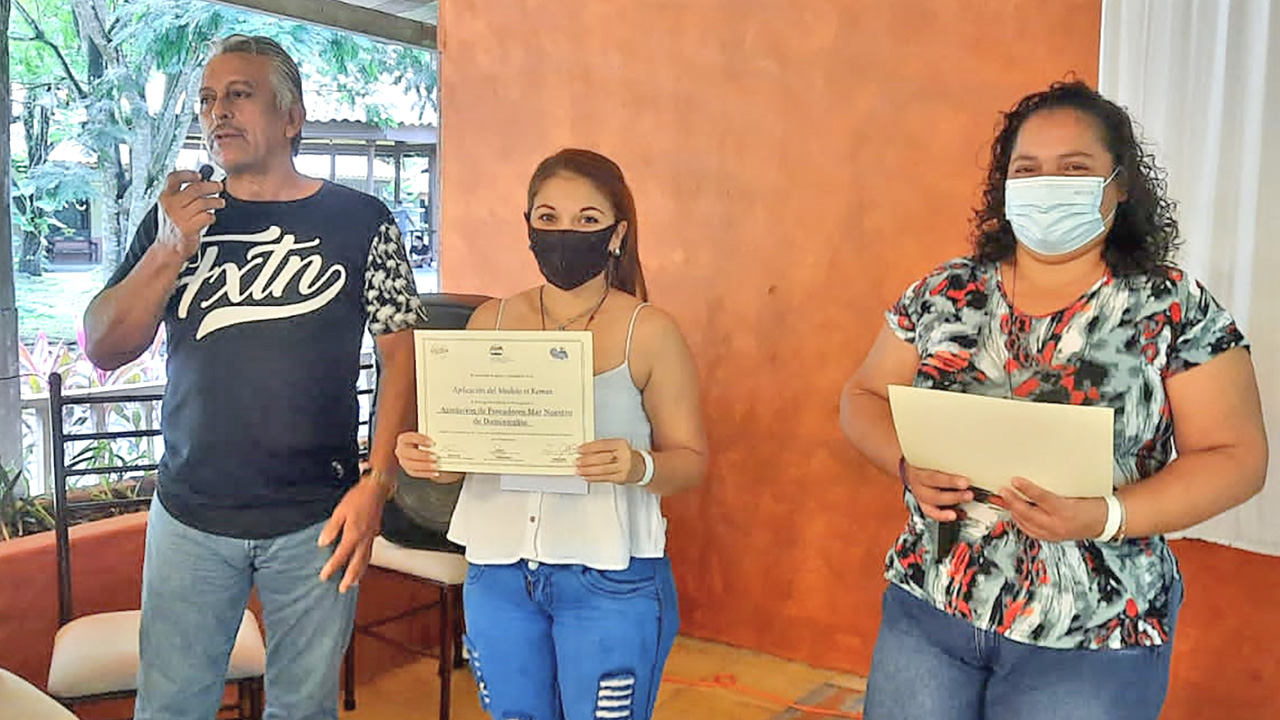
CoopeSoliDar R.L., 2021 Co-coordinators of the Network: Rolando Ramírez and María Carrillo, presenting the certificate of participation to Pamela Méndez from the Marine Area of Responsible Fishing of Dominicalito.
This 2nd Congress was grounded in the need to generate a vision of human rights in small-scale artisanal fishing, to work on the practical aspects of this issue, and to set a course for the recognition of the valuable contributions of Costa Rica’s fishing communities. We concluded with an agreement to continue our work for greater justice and equity for the people of the sea.
Translated from Spanish by Susan Crosby, Proofread by Chris Jarrett.